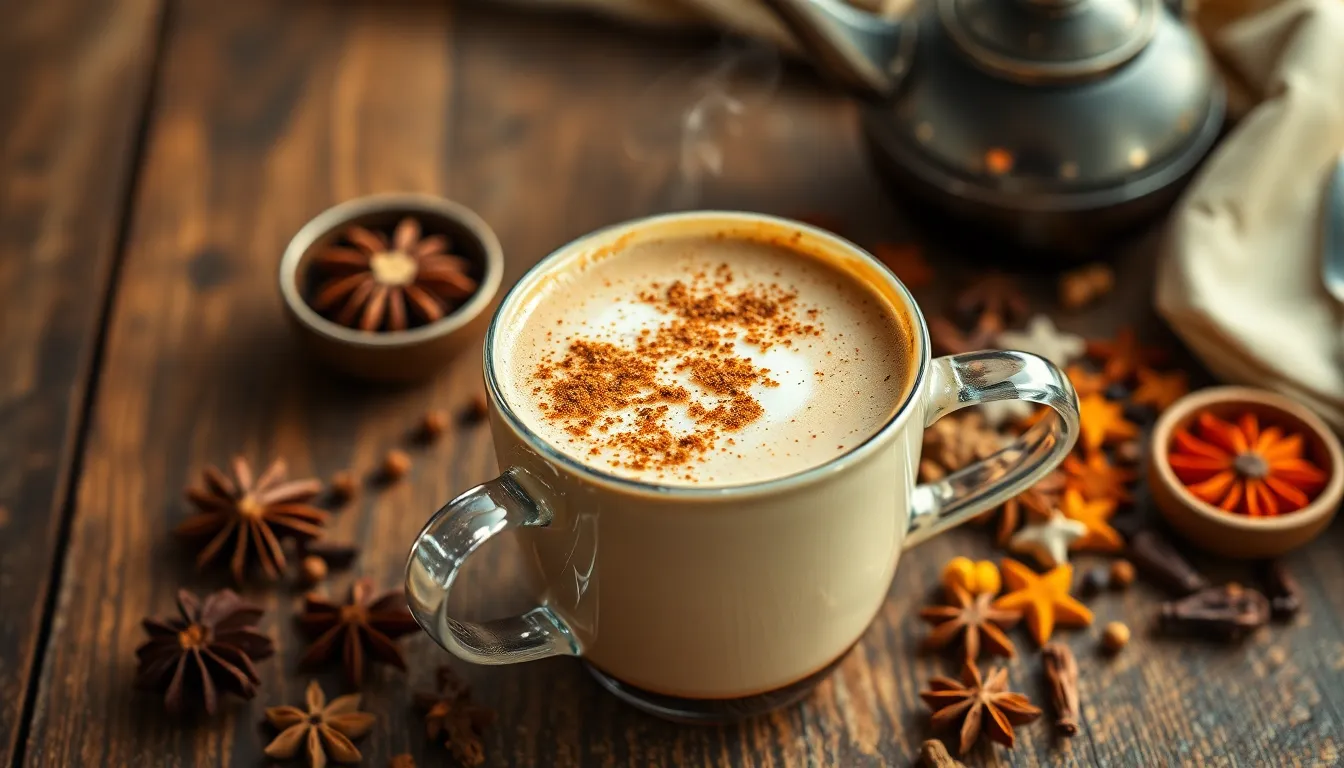Table of Contents
ToggleChai tea lattes are like a warm hug in a cup, blending rich spices with creamy goodness. But what about that little kick of caffeine? Many people dive into this delightful beverage without realizing it packs a punch that can rival a double shot of espresso. It’s the perfect blend of comfort and alertness, ideal for those who want to stay awake without sacrificing flavor.
Imagine sipping your chai latte, feeling cozy while also getting that much-needed boost to tackle your to-do list. With its unique combination of black tea and spices, chai tea latte offers a delicious way to caffeinate. So, whether you’re a caffeine connoisseur or just someone looking for a tasty pick-me-up, let’s explore how much caffeine is really hiding in your favorite cup of chai.
Overview of Chai Tea Latte
Chai tea latte features a blend of black tea, spices, milk, and sweeteners, creating a delightful and aromatic drink. The rich combination of flavors includes cinnamon, cardamom, ginger, and cloves, providing warmth and comfort in every sip. Many people enjoy this beverage for its creamy texture and the invigorating boost it offers.
An essential aspect of chai tea latte is its caffeine content. A typical serving, which is about 12 ounces, contains approximately 50 to 100 mg of caffeine. This amount varies based on brewing time and the specific type of black tea used. Compared to coffee, which has about 95 mg of caffeine per 8-ounce cup, chai tea lattes deliver a milder yet effective caffeine experience.
Nutrition plays a role in the appeal of chai tea lattes. They can contain around 200 calories, depending on the milk and sweeteners chosen. Various options for milk are available, including almond, coconut, and oat, allowing for customization according to dietary preferences. When made with non-dairy milk, caloric values may differ, and this can affect the drink’s overall richness.
Chai tea lattes are often consumed for their inviting aroma and soothing qualities. Individuals seeking a flavorful beverage that provides both comfort and alertness find chai tea lattes appealing. Regularly, people enjoy this drink warm or iced, further enhancing its versatility and accessibility throughout the seasons.
Caffeine Content Comparison

Chai tea lattes offer a unique caffeine experience. Traditional chai, made with brewed black tea and spices, typically contains less caffeine than its latte counterpart. A standard cup of traditional chai holds about 30 to 60 mg of caffeine, varying by steep time and tea type. In contrast, a chai tea latte, prepared with a concentrated blend of black tea and spices mixed with steamed milk, ranges from 50 to 100 mg of caffeine.
Traditional Chai vs. Chai Tea Latte
Traditional chai often includes hot water or milk, depending on preference, and results in a lower caffeine content than a chai tea latte. The concentrated mixture in a latte enhances both flavor and caffeine levels. A chai tea latte provides a creamier texture and more robust flavor profile. Differences also arise from the amount of black tea used, influencing overall caffeine strength.
Factors Affecting Caffeine Levels
Brewing time significantly impacts caffeine extraction, with longer steeping yielding higher levels. The type of black tea used also plays a critical role. Varieties like Assam tend to have more caffeine compared to Darjeeling. Additionally, adding or reducing milk affects caffeine perception. Sweeteners and spices may contribute to taste but not directly influence caffeine content. Preferences in preparation can thus create different experiences within the same beverage category.
Health Benefits of Caffeine in Chai Tea Latte
Caffeine in chai tea latte offers various health benefits that enhance the beverage’s appeal.
Boosting Metabolism
Caffeine stimulates metabolism, aiding in energy expenditure. It can help promote fat oxidation, contributing to weight management. Studies demonstrate that caffeine intake increases resting metabolic rate. Additionally, consuming a chai tea latte regularly can support workout performance, enabling better calorie burning. Including spices like ginger and cinnamon in chai also enhances digestion, complementing caffeine’s effects.
Enhancing Mental Alertness
Caffeine is well-known for enhancing mental alertness. It increases concentration and supports cognitive performance, making chai tea lattes ideal during busy days. Research indicates that caffeine improves reaction time, which benefits tasks requiring focus. Sipping a chai tea latte can provide a comforting caffeine boost while avoiding jitters. Personalizing the drink with milk options adds creaminess, further enriching the overall experience.
Potential Risks of Caffeine Consumption
Caffeine in chai tea lattes poses certain risks that warrant attention.
Caffeine Sensitivity
Individuals vary significantly in their sensitivity to caffeine. Some experience jitters, increased heart rate, or anxiety even with small amounts. Caffeine content in a chai tea latte typically ranges from 50 to 100 mg. For those sensitive to caffeine, this level may lead to discomfort. Recognizing personal tolerance levels matters, as moderation ensures enjoyment without adverse effects.
Impact on Sleep
Caffeine consumption can disrupt sleep patterns. Those consuming chai tea lattes should be cautious, especially in the afternoon or evening. The stimulating effects of caffeine may lead to difficulty falling asleep or fragmented rest. Research indicates that caffeine intake even six hours before bedtime can affect sleep quality. Prioritizing caffeine-free beverages later in the day could promote better sleep health.
Chai tea lattes stand out as a delightful fusion of flavor and function. They provide a comforting way to enjoy caffeine while indulging in a rich blend of spices. With their unique balance of warmth and alertness, these beverages cater to those looking for an enjoyable pick-me-up.
Customization options allow each drinker to tailor their experience, making it a versatile choice for any time of day. However, it’s important to be mindful of caffeine intake, especially for those sensitive to its effects. By understanding personal tolerance levels and making informed choices, chai tea lattes can be savored without compromising well-being.




